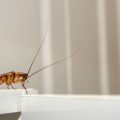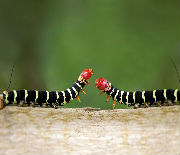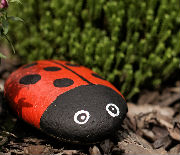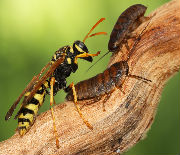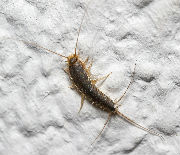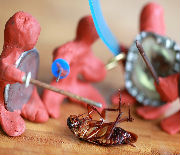Finding maggots in your home can be unsettling and unhygienic. These wriggling fly larvae thrive in decaying organic matter, quickly turning a small issue into a larger infestation. But don’t worry – tackling the problem effectively is entirely possible. We’ll show you exactly how to get rid of maggots in the house and prevent them from returning.
Table of Contents
What are maggots?
All fly larvae are called maggots in general. There are many species of maggots, just as there are flies. Conical in shape, they are typically cream or light brown and have a dark mark-like breathing hole on their posterior. A maggot doesn’t have teeth; instead, it has mandibles that help it grasp its food.
Food and waste attract flies. They lay their eggs on the rubbish, which later hatch into maggots, sometimes within 24 hours! The only way to prevent maggots from growing in your waste is to prevent flies from getting to it in the first place.
Check also: How to Get Rid of Flies
How long do maggots live?
Maggots transform into pupae before hatching into flies. The whole life cycle is approximately ten days in the summer and thirty days during the cooler winter months.
Where do maggots come from?
You might find maggots in or near your home if you store your rubbish improperly, leave your dog’s droppings on your lawn for too long, or if there’s a dead animal somewhere on your property. Flies find these to be great egg-laying spots. Upon hatching, the maggots burrow into the material and eat until they reach their next metamorphic stage.
Despite invading quietly, maggots must be dealt with quickly. This is especially true if you have pets, as a maggot infestation can cause them to get sick. Any food that contains maggots and the accompanying bacteria may cause food poisoning if consumed by humans, too.
Do maggots pose a health risk?
The presence of maggots is unpleasant, and they can indeed cause some sickness, but there is no evidence that they pose any significant health risks. Following the advice here will ensure that your household waste won’t attract flies and leaves you with a clean environment.
What attracts maggots to the house?
Maggots show up because something in your house drew flies to deposit their eggs; they do not just show up out of thin air. Preventing an infestation starts with determining what appeals to them indoors.
Among the most common culprits is food waste. Should food waste be left out or your kitchen bin not be sealed correctly, flies will find it ideal for laying eggs. Their attention can be drawn even to small things like crumbs on the floor, dirty dishes, or spilt beverages. Another hotspot is pet food left out too long; flies can deposit eggs there in no time.
Still, it’s not only about food. Damp or stinky areas—like a leaky trashcan or a dirty sink—draw flies as well. Flies will not hesitate to make themselves at home if there is any hidden organic material—food caught in gaps, under appliances, or in the corners of cupboards. Your best line of protection against drawing maggots at home is keeping your house dry and clean.
Check also:
How to get rid of maggots in the house
Finding maggots in your home is one of those “oh no, not today” moments we all dread. But don’t worry! While it might feel like the end of the world when you see those squirmy critters, you can tackle the problem quickly and effectively if you know what to do.
1. Find the source of the infestation
Maggots are always feeding on something; they do not show without cause. Start by finding the source—your kitchen bin, food waste under an appliance, even a forgotten spill in a secret nook. Look at all possible hotspots including behind the sink, behind furniture, under trash cans and pet food bowls.
2. Remove the food source
Once you have located the maggots’ feeding site, completely clean the area. Stuff any infected food or trash in a strong plastic bag and toss it in an outdoor bin. Tightly closed bin lids help to stop flies from returning and laying new eggs.
3. Kill maggots instantly with home remedies
Now, for the satisfying part—getting rid of the maggots themselves. For those wondering what kills maggots instantly home remedies work wonders. a few common household items work wonders.
- Does vinegar kill maggots? – Absolutely! Mix equal parts white vinegar and boiling water, then pour it over the maggots. The heat and acidity will kill them on contact. Bonus: vinegar helps neutralize any lingering smells.
- Boiling water – Boil a large pot of water and pour it directly over the maggots. The heat will kill them instantly. This is a quick, chemical-free solution that works well on hard surfaces like floors or inside trash cans.
- Salt – Sprinkle table salt directly over the maggots. Salt dehydrates them, causing death within minutes. This method is particularly effective for small infestations.
- Diatomaceous earth – Dust the maggots with food-grade diatomaceous earth. The powder breaks their exoskeletons and causes dehydration and death. Children and pets can be close to diatomaceous earth without risk since it is a natural, non-toxic solution.
4. Clean the infested area thoroughly
Sanitise the space once the maggots have been taken out to guarantee no eggs or bacteria linger. Use a disinfectant following careful hot, soapy water scrubbing of the area. Look for cracks or places where eggs could still be hiding.
5. Take preventative measures
Now, if you’re not too fond of having a bunch of maggots as roommates again, you might want to know how to prevent a future infestation. Here are some things you can do:
- An excellent way to eliminate flies from your rubbish is by using wheelie bins. These are better than black bin bags for preventing flies from getting into your trash. Also, avoid placing the bin directly in the sun, if possible.
- You can buy fly spray to help combat flies in your home.
- Make an effort to reduce food waste in your home – this way, the maggots will have fewer things to feast on.
- You should never leave food uncovered inside the home, including cat/dog food, because flies might lay eggs there.
- You can also reduce odours by rinsing polystyrene food trays and other food packaging that can’t be recycled before you throw them out.
- Bin lids should be securely closed to prevent flies from getting in.
- Consider using Citronella as a natural remedy. This will deter flies since they do not like the smell.
When to hire a professional exterminator to treat maggots?
Eventually, the infestation might become impossible to control, or you might not have the strength to cope with it any longer. If the infestation has taken over multiple rooms of the house, or if you have tried to clean an area out numerous times, but the pests still returned, it might be time to turn to the experts.
Professionals have the technical knowledge, as well as access to the specialised products and equipment needed to treat a maggot infestation safely and effectively.
Are you dealing with a pest infestation?
You don't have to be alone in the battle against pests. Hire a professional pest expert!
Call usFinal thoughts
Dealing with maggots in the house can be resolved with the correct strategy and some patience. The key is acting fast – don’t let those wriggling pests get comfortable!
But getting rid of maggots is just one part of the solution. Prevention is where the real magic happens. Keeping your home clean and cutting off access to food scraps isn’t just about hygiene; it’s about keeping your space your and pest-free.
Keep in mind that all maggots begin as fly eggs, thus ending that cycle is the ultimate victory. You’re not simply solving the issue, you’re taking charge and making sure it doesn’t happen again.


